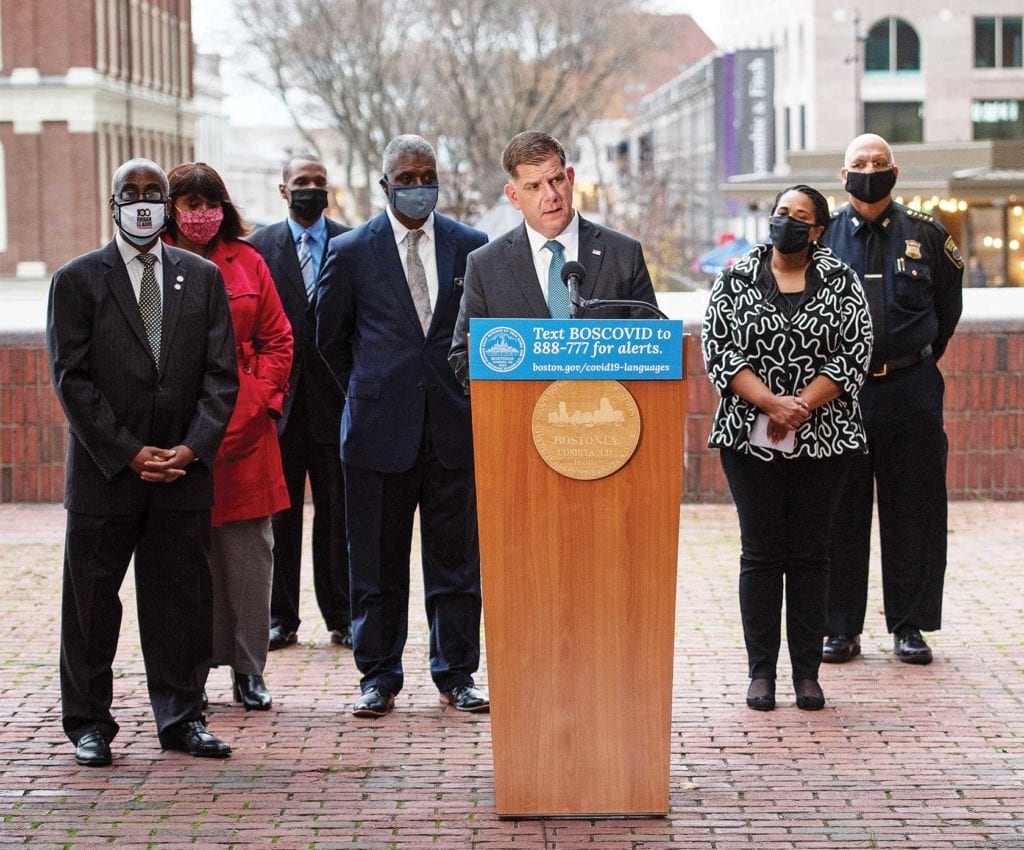
Mayor Martin Walsh has signed two executive orders in the next step of implementing recommended police reforms. The Boston Police Reform Task Force Walsh created in July recommended that he institute an Office of Police Accountability and Transparency, which would house an Internal Affairs Oversight Panel and a Civilian Review Board with the power to investigate the Boston Police Department. Both would replace the Community Ombudsman Oversight Panel (CO-OP), which currently reviews the BPD’s internal affairs investigations.
In October, Walsh promised to implement three of the task force’s recommendations immediately; he started with a home rule petition to the State House that would give preference to BPS and METCO graduates when hiring police officers — a measure aimed at increasing diversity in the police force. The executive orders announced Nov. 12 are meant to establish greater accountability and reconstitute the CO-OP, which could not conduct its own investigations, and hadn’t issued a public report in several years.
The conversation on replacing the CO-OP is not new. In 2015, former District 4 City Councilor Charles Yancey proposed an 11-member civilian review board with members appointed by nonprofit organizations. In 2017, the CO-OP was supposed to expand from three to five members. It had reviewed cases investigated by the BPD’s Internal Affairs Division over four years but had not released any data. The CO-OP was never a true civilian review board, as it could not conduct its own investigations of complaints civilians had against the police.
After Walsh failed to increase the number of members and the CO-OP dropped in activity and relevance, City Councilors Andrea Campbell, Julia Mejia and Ricardo Arroyo introduced an ordinance in July calling for a permanent civilian review board.
Campbell has maintained throughout the process of the mayor accepting the task force’s recommendations that the city should implement her ordinance.
“We need to establish a Civilian Review Board that will be effective in creating the kind of police accountability and transparency that our residents deserve,” Campbell said in a statement to the Banner. “For me, that means passing the Council’s Civilian Review Board ordinance, which would create one board with the independence and authority to review and investigate all cases — internal affairs, citizen complaints of police misconduct, and complaints filed by officers or BPD personnel.”
As it stands, under the mayor’s executive order, the IAOP will have the power to review all of the Internal Affairs Divisions’ completed investigations, and all of its policies and procedures. A separate Civilian Review Board would review BPD complaints from citizens, and both would be underneath the Office of Police Accountability and Transparency, which would have subpoena power to investigate any police misconduct.
“The Mayor’s move to establish two separate boards with different rules, authority and appointing structures undermines the goal of ensuring true civilian oversight that is independent and accessible to the public,” Campbell said.
Both the councilors’ proposal and the mayor’s order call for a civilian review board with members appointed by the mayor and city council. However, Campbell’s board would regularly collect and publish data on the number of use-of-force incidents and arrests made by the BPD. The ordinance from the City Council also proposes a permanent office, while the mayor’s executive orders could be revoked by a new mayor.
On December 1, the council will hold a working session on the civilian review board ordinance.






